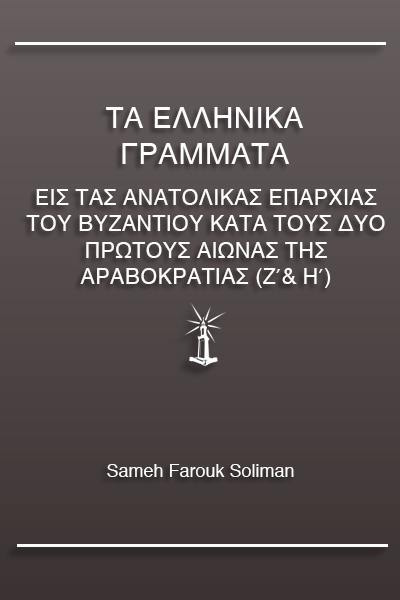ΕΛΛΗΝΙΚΑ ΓΡΑΜΜΑΤΑ: ΕΙΣ ΤΑΣ ΑΝΑΤΟΛΙΚΑΣ ΕΠΑΡΧΙΑΣ ΤΟΥ ΒΥΖΑΝΤΙΟΥ ΚΑΤΑ ΤΟΥΣ ΔΥΟ ΠΡΩΤΟΥΣ ΑΙΩΝΑΣ ΤΗΣ ΑΡΑΒΟΚΡΑΤΙΑΣ (Ζ’ & Η’)
This thesis covers Greek literature (“Letters”) in the eastern provinces of Byzantium during the first two centuries of Arab rule (the 7th and 8th centuries). In it, the author aims to project the true value of this literary production, which he sees as underestimated, through its comparison to that of the ancient Greeks. The author attempts to provide evidence that…
This thesis covers Greek literature (“Letters”) in the eastern provinces of Byzantium during the first two centuries of Arab rule (the 7th and 8th centuries). In it, the author aims to project the true value of this literary production, which he sees as underestimated, through its comparison to that of the ancient Greeks. The author attempts to provide evidence that Greek literature and opportunities for its study were still prevalent, especially in the eastern provinces. Monks throughout Syria and Palestine took it upon themselves to preserve ancient Greek culture, demonstrating their vital role in the development of the sacred and secular state under Arab rule. However, as a result of an intense crisis between the separate branches of the church, interest in the study of ancient Greek authors waned. The authors of this period therefore turned to the creation of hymns, treatises against heresy, and hagiological writings.
Online edition of a 2007 dissertation submitted to the School of Philosophy, National and Kapodistrian University of Athens. Copyright, Sameh Farouk Soliman. Published here by permission of the author.
Use the following persistent identifier: http://nrs.harvard.edu/urn-3:hul.ebook:CHS_Soliman.Ta_Ellinika_Grammata.2007.
This work is licensed under a Creative Commons 3.0 License.

